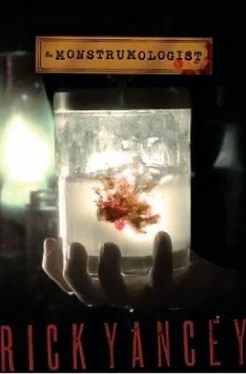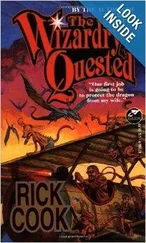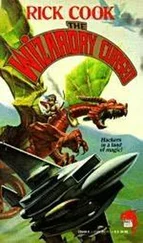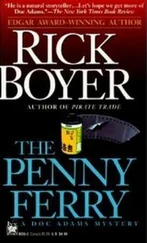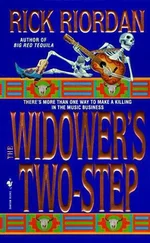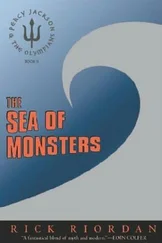“Curiouser and curiouser,” Kearns breathed as we crowded behind him to peek over his shoulder. “Of all places to put a clock! What do the dead care of the time?”
“What do they care?” echoed Morgan in a hoarse whisper.
Kearns reached into the nook and pushed against the minute hand. He brought his ear close, moving the metal arm slowly to mark a quarter past. He grunted and leaned back to smile at Morgan. “They don’t, Constable. It’s a letter shy of being a clock.”
He rotated the large hand back to the 12, pressed his hands against the marble, spread his legs for balance, and pushed with all his might against the stone.
“This is ridiculous!” cried Warthrop. He had reached the end of even his considerable endurance. Beside him Morgan’s mouth moved as he spelled out the word “clock,” trying to puzzle out Kearns ’s enigmatic answer. “We are wasting precious-”
“It would be a number that held some significance to him,” Kearns interrupted. “Not an actual time of day. A date, or perhaps a verse from the Bible, a psalm or something from the Gospels.” He snapped his fingers impatiently. “Quickly, famous passages!”
“Psalm twenty-three,” Malachi offered.
“Not enough hours,” Morgan argued.
“Might be military time,” Kearns mused. He set the clock to 8:23. This time both he and Malachi, who seemed infected with Kearns ’s excitement, pushed against the stone, but the huge slab did not budge.
“John 3:16,” Malachi guessed next. Still nothing. Warthrop snorted with disgust.
“Pellinore!” called Kearns. “What year was your father born?”
The doctor waved him away. Kearns turned back to the clock face, fingers restlessly caressing his mustache. “Perhaps the year Pellinore was born…”
“Or his wife, or his anniversary, or any number of combinations for your clock without a C !” huffed the constable, having decoded Kearns ’s cryptic phrase at last. “It’s hopeless.”
Behind us Warthrop said, “The witching hour.” I noted the sad expression in his eyes, an acknowledgment of the unacceptable, the recognition of a conclusion unavoidable.
“‘The witching hour approaches,’” he continued. “From my father’s diary: ‘The witching hour approaches… The hour comes, and Christ himself is mocked.”’
“Midnight?” asked Kearns. “But we tried that.”
“The witching hour is an hour past,” said Morgan. “One o’clock.”
Kearns appeared dubious, but with a shrug tried that combination. Again the great slab would not move, even with all our shoulders pressed upon it.
“What did he say again?” Kearns asked. “The hour when Christ himself is mocked?”
“After his trial he was mocked by the Roman soldiers,” Malachi said.
“But what hour was that?”
Malachi shook his head. “The Bible doesn’t say.”
Warthrop thought for a moment, bringing all his prodigious powers of concentration to bear upon the riddle. “Not mocked by soldiers,” he said slowly. “By witches. The witching hour is three a.m., in mockery of the Trinity and a perversion of the hour of his death.” He drew a deep breath and nodded decisively. “It’s three o’clock, Kearns. I’m sure of it.”
Kearns set the hands to three o’clock, the tumblers inside softly clicked, and, before Kearns or anyone else could try his luck, Warthrop reached out and pressed against the nerveless rock. With a grinding groan the secret door slid straight back, creating an opening on one side through which two men could walk abreast. Neither light nor sound escaped from that dark fissure, only the faintest odor of decay, a smell with which I had, unfortunately, become all too familiar. Like the grave, what lay behind the great marble door was black and silent and reeked of death.
“Well!” Kearns said brightly. “Shall we draw lots to see who goes first?”
Malachi pulled the lamp from my hand. “I will go,” he announced grimly. “It is my place; I’ve earned it.”
Kearns pulled the lamp from Malachi’s hand. “It is my place; I’m being paid for it.”
Warthrop pulled the lamp from Kearns ’s hand. “The place is mine,” he said. “I inherited it.”
He glanced at Morgan, who misread the meaning of it. The constable dropped a hand onto my shoulder. “I’ll look after Will Henry.”
Before Malachi or Kearns could protest, Warthrop ducked into the opening. The light of the lamp faded, then disappeared altogether. For several excruciatingly elongated minutes we waited without speaking, straining our ears for any sound to emerge from the stygian darkness that dwelled behind the secret door. The lamp’s glow returned at last, attended by the doctor’s lean shadow, following next its glow upon his drawn features; I’d never witnessed him wearier.
“Well, Warthrop, what did you find?” demanded Morgan.
“Stairs,” replied the doctor quietly. “Descending down a narrow shaft-and a door at the bottom.” He turned to Kearns. “I stand corrected, Jack.”
“When have you ever known me to be wrong, Pellinore?”
The doctor ignored the question. “The door is locked.”
“A good sign,” Kearns said, “but a bad circumstance. I don’t suppose your father bequeathed you the key to it.”
“My father willed me many things,” replied the doctor darkly.
Kearns called for the crate to be brought inside the tomb, and he quickly laid out the supplies for the hunt: extra ammunition for the rifles; six of the remaining grenades; a small sack containing a collection of sachets, perhaps two dozen in all, their shape and size reminding me of tea bags; a tight coil of sturdy rope; and a bundle of long tubes with short, fat strings protruding from one end.
“What is that, Cory?” asked Morgan, pointing at the bundle. “Dynamite?”
“Dynamite!” exclaimed Kearns with a slap of his open hand against his forehead. “Now, that is something I should have thought of!” He pulled three canvas bags from the crate and packed each with two grenades, bullets, and a fistful of the little paper packets. He patted the empty sheath strapped to his leg and wondered aloud where his knife had gone.
“I have it, sir,” I said, and held out the knife.
“How is it you keep ending up with my knife, Will Henry?” he asked playfully. He flicked the wickedly sharp blade against the twine binding the sticks and distributed them equally into the bags.
“They’re long-burning flares, Constable,” he informed Morgan. “Bright light for dark work.” He slung one of the bags over his shoulder and handed another to the doctor. The last he dangled in the constable’s direction. “Bobby-or would you prefer to delegate the duty to one of your brave volunteers?”
Malachi snatched the bag from Kearns. “ I am going.”
“Your zeal is admirable, but I worry about its effect upon your judgment,” Kearns replied reasonably.
“I watched this thing murder my sister,” Malachi shot back. “I am coming with you.”
Kearns responded with a sunny smile. “Very well. But if your bloodlust gets in the way of my job, I’ll put a bullet in your head.”
He turned away from the tortured boy, his gray eyes twinkling merrily in the lamplight. “She has every advantage, gentlemen. She is faster, stronger, and what she lacks in intelligence she more than compensates for with her cunning. She knows the lay of the land, whereas we do not, and she can navigate it in darkness as black as pitch, which of course we cannot. We’ve no choice in the matter, of course, but the light we bring announces our presence; it will draw her to us like a moth to the flame. Her only weakness is the overriding instinct to protect her young, a vulnerability we may be able to exploit, should we be lucky enough to separate them from her maternal care. When threatened in the wild, poppies sequester their young in the lowermost chambers of their underground dens. That’s our destination, gentlemen, the very bowels of the earth, though we might not reach them; she may meet us halfway, or she may simply wait for us, but the odds we will have the element of surprise on our side are practically nil: We are the hunters-and we are also the bait.”
Читать дальше
